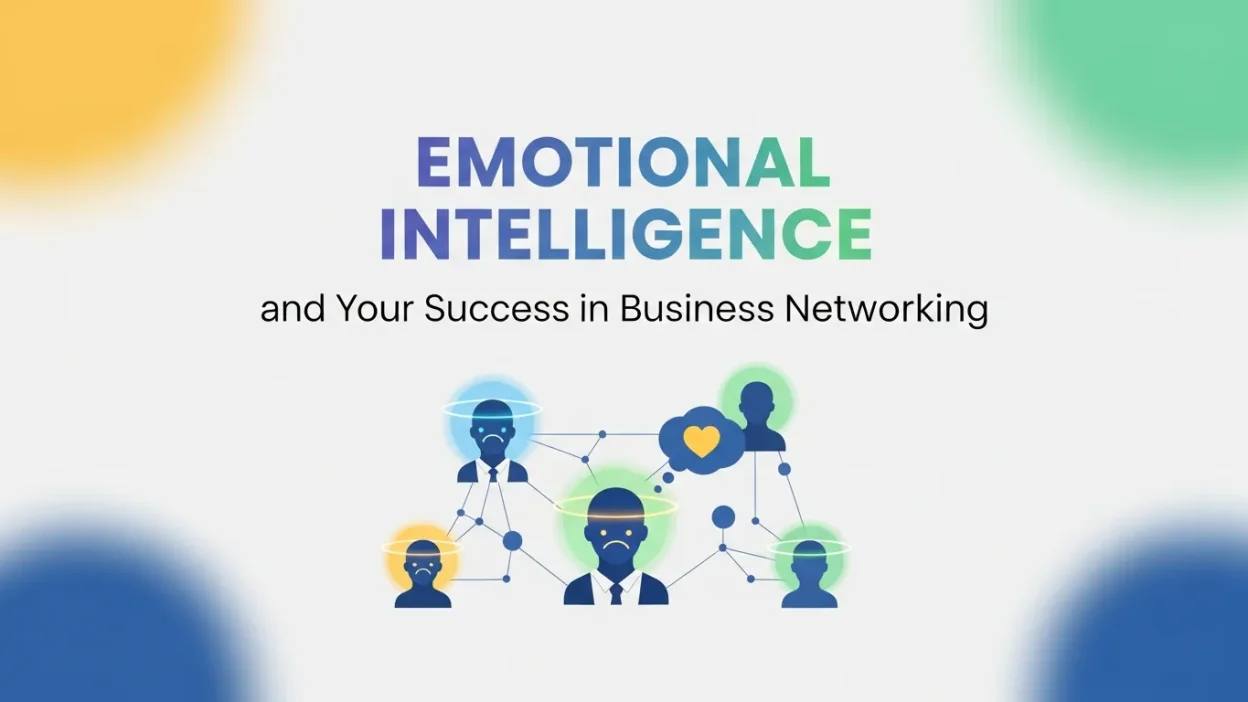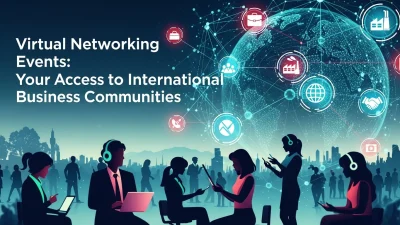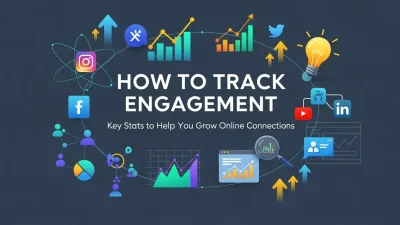Networking effectively isn’t just about exchanging business cards—it’s about forming meaningful, lasting connections. Emotional intelligence (EI) plays a crucial role by helping you understand your emotions, read others, adjust your communication, and manage relationships strategically. By applying EI, you can overcome networking anxiety, build authentic connections, and turn casual interactions into professional opportunities. This approach emphasizes active listening, social awareness, strategic vulnerability, and consistent follow-up, making networking less stressful and far more productive.
Networking is a minefield of its own. You enter a room of strangers with nothing more than business cards and a rehearsed elevator pitch in tow, and wish for meaningful connections. But a lot of professionals go to these not-exactly-networking events, then leave them dragging, with a bulging pocket full of cards of people they will never remember.
And the differentiator between those who manage to do well in these settings and those who suck at it usually boils down to a single thing: emotional intelligence. What separates them is not just how well they connect with others, but how well those connections turn into lasting business relationships.
In networking, emotional intelligence is more than just being a nice, sociable person. It is about knowing your emotions, reading the room, and adjusting your behavior to create real connections that add value to all involved. Once you’ve mastered these skills, networking ceases to be a cringe-inducing chore and becomes a potent engine for career success and business growth.
A Look at Emotional Intelligence and Emotional Marketing at Work
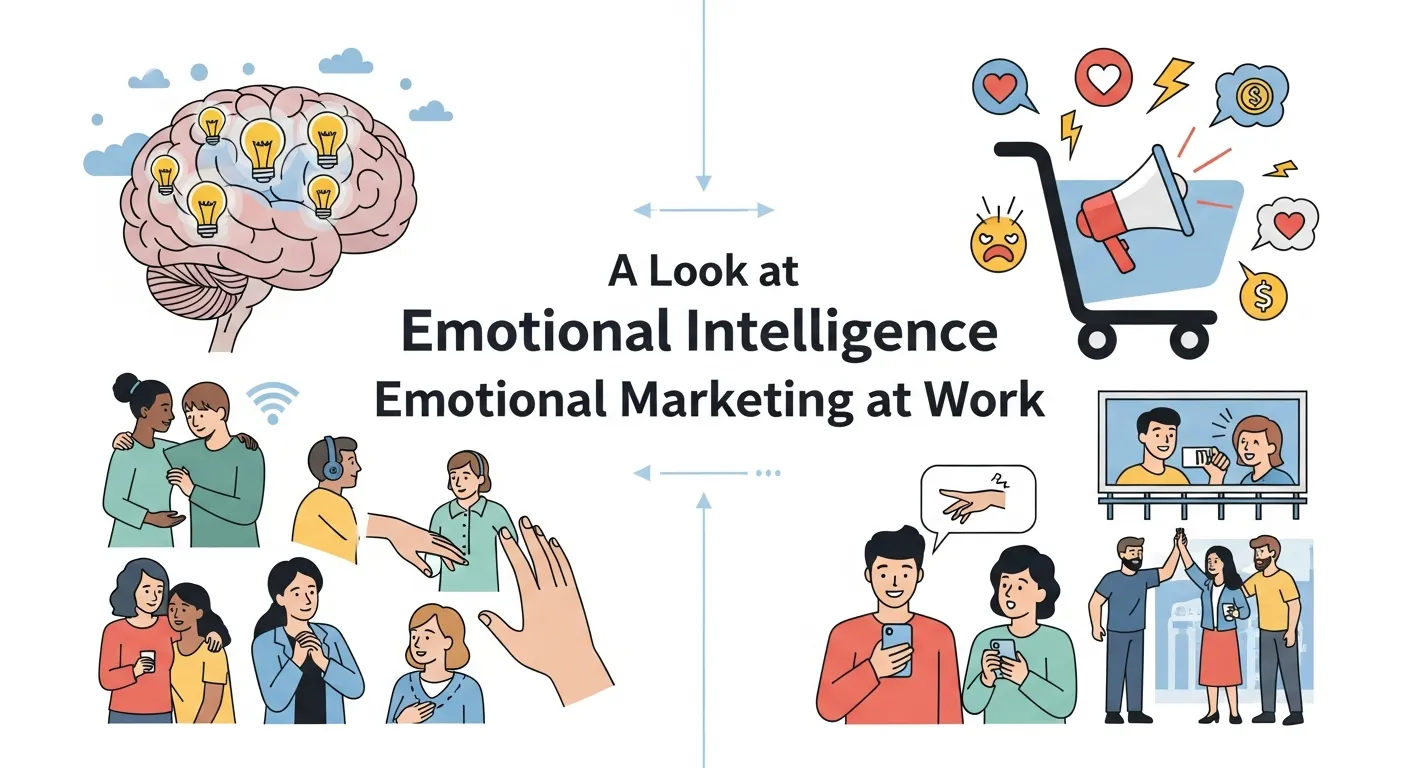
Your networking efforts—and even your professional influence—are shaped by four key elements of emotional intelligence (EI).
-
Self-awareness: Recognize your own emotions and understand how they affect your behavior in social situations. This helps you notice triggers and respond intentionally rather than react impulsively.
-
Self-regulation: Control your emotional responses, stay calm under pressure, and adapt your communication even when conversations become challenging.
-
Social awareness: Read the room by observing others’ tone, behavior, and engagement levels. This allows you to tailor your approach to each individual, a skill that overlaps directly with emotional marketing—using empathy and insight to craft messages or offers that resonate deeply with your audience.
-
Relationship management: Leverage your understanding of emotions to nurture meaningful professional relationships and connections. Emotional marketing strategies use the same principle—building trust and connection by understanding the emotional needs and desires of your target audience.
These skills become especially powerful in networking, where first impressions matter, and genuine emotional connections distinguish highly successful professionals from those struggling to grow their network. By combining emotional intelligence with emotional marketing principles, you not only build relationships but also create influence that resonates on both personal and professional levels.
Key Components of Emotional Intelligence for Networking
Emotional intelligence in networking is built on four main pillars, each contributing to stronger professional relationships:
- Self-Awareness: Recognize your emotions and how they influence interactions.
- Self-Regulation: Manage impulses and respond thoughtfully to different networking situations.
- Social Awareness: Read cues from others’ body language, tone, and expressions.
- Relationship Management: Use your understanding of emotions to foster meaningful connections.
Emotional Awareness and Authentic Connections
True networking begins with a sincere interest in other people. It changes how people respond when you come to a conversation out of curiosity rather than a sales agenda. They’re more welcoming to you and remember you more fondly.
Listen for what really lights up the person you’re talking to. Their energy will change when they talk about topics they love. This emotional change, then, can potentially tell us how to reach them better.
Listening as a Strategic Networking Tool
Active listening is more than nodding politely; it signals genuine interest and builds trust.
-
Listen to understand, not to respond.
-
Reflect back what the other person shares to show engagement.
-
Ask clarifying questions that demonstrate attentiveness.
Observing Social Signals and Body Language
Nonverbal communication interpreters “I think you would find that most successful networkers are good at nonverbal communication. Look for signs of interest, such as leaning in, giving you eye contact or asking follow-up questions. On the other hand, notice when someone appears distracted, is often on their phone, or gives yes/no responses.
These signals allow you to change your strategy on the fly. If a correspondent seems in a hurry, acknowledge this and offer to talk at a later time. If they seem sincerely interested, take it up a notch.
Adjusting Communication Styles for Maximum Impact
Networking success often depends on your ability to adapt your communication style to match others’ preferences:
-
Direct & Concise: For results-focused professionals.
-
Storytelling & Relational: For individuals who value rapport and personal connection.
-
Analytical & Data-driven: For technical or research-focused contacts.
Changing the Way You Communicate
People communicate in all manner of ways. Others enjoy conversations that are straightforward and results-oriented. Others prefer establishing rapport through chitchat and personal anecdotes. Emotionally intelligent networkers adjust their communication style to the preferred style of their conversation partner.
This doesn’t mean like fake or manipulative or anything. Rather, it’s about communicating your authentic self in a manner that makes sense for others.
Controlling Your Own Emotions at Networking Events
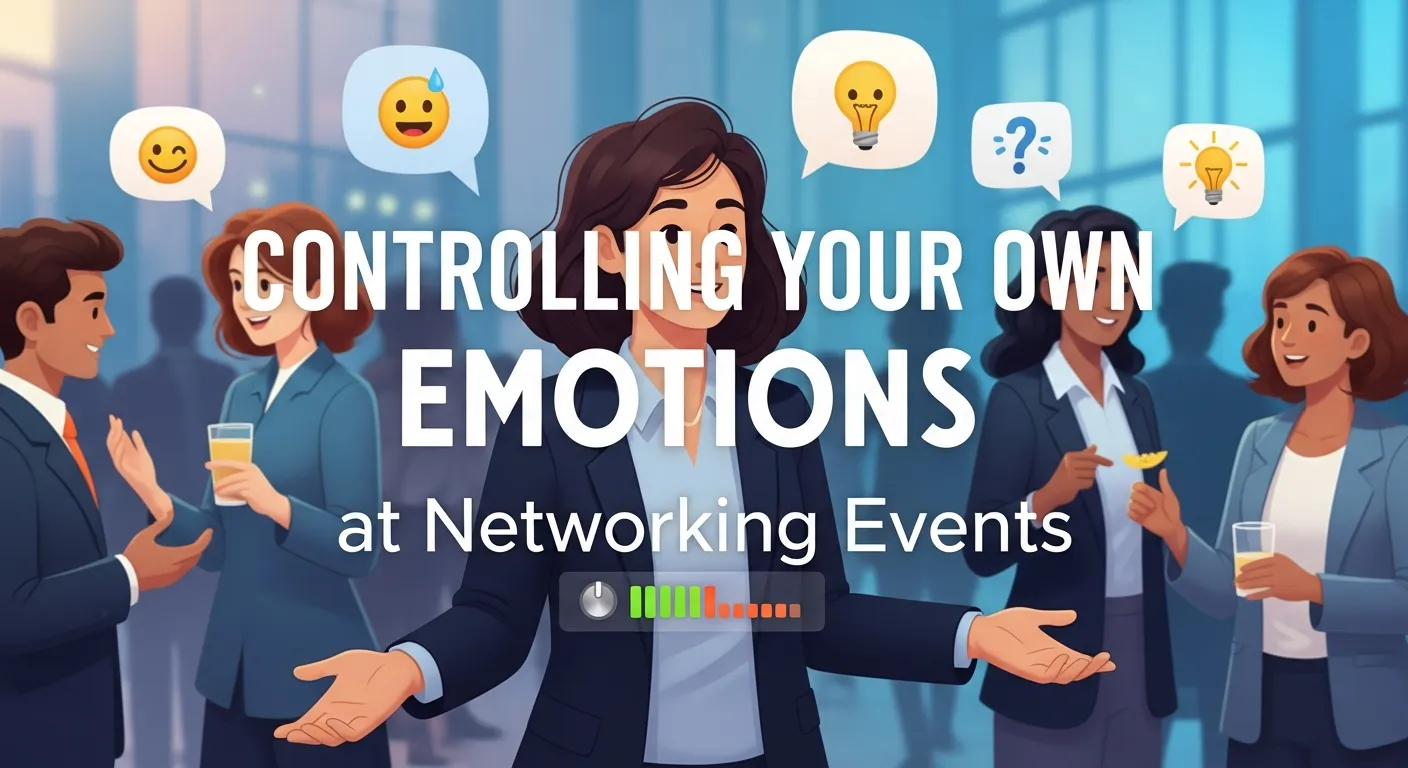
Networking can bring up all sorts of uncomfortable feelings — nervousness about meeting new people, the frustration of conversations not going the way you had hoped, or the disappointment of a promised follow-up that never happened.
Emotional intelligence allows you to acknowledge these feelings without allowing them to get in the way of networking. Some breathing exercises or positive self-talk can help bring you back to center when you notice stress rising. When you’re frustrated, you can reframe the situation and choose to instead look at what you can learn from it.
Overcoming Networking Anxiety
Networking anxiety is something experienced by many in the professional world, especially introverts or people who are relatively new to their industry. Emotional intelligence offers mechanisms for this kind of fear management.
Before competition, prepare yourself mentally by making reasonable goals. Instead of trying to talk to everybody in the room, just have three meaningful, solid conversations. This takes some pressure off, so you can have real conversations.
Preparing for High-Stakes Networking Events
Preparation reduces stress and increases confidence. Key steps include:
-
Research attendees and speakers in advance.
-
Set realistic networking goals (e.g., 2–3 meaningful conversations).
-
Practice concise self-introductions or personal elevator pitches.
Being Resilient in the Face of Rejection
You won’t connect with everyone you network with. Some people will be uninterested in making a connection, and some people may not end up following through with what they say. Highly emotionally intelligent networkers understand that these moments are not personal.
They realize that when they hear a “no” it probably isn’t a reflection of who they are as a person and more likely, it’s about timing, priorities, even compatibility. Such a viewpoint contributes to keeping confidence and motivation in the context of continued networking.
Making the Emotional Connection Between Business and Success
It’s emotional connections, not common business interests, that form the strongest professional relationships. When you are able to develop those deeper connections, then you’re more likely to have people refer business to you, work with you on projects, or help you move ahead in your career.
Cultural fervour: connections are made when people feel heard and valued. How this works is simple – listen to what they have to say, take a real interest in their problems and ambitions, and figure out a way to give back to them with no strings attached.
The Vulcan Mind-Meld of Vulnerability in Business Relationships
A strategic show of weakness can serve to strengthen professional relationships. Sharing struggles or what you are learning makes you more human and relatable. This doesn’t require you to overshare personal issues, but to show that you’re still growing and learning.
When you open up about a professional obstacle you’ve faced, others will often do the same. This shared vulnerability forms stronger connections than chatting about what’s going on in the industry.
Aftermath the Emotional Intelligence Way
Follow-up is the part where most networking attempts fall down. Good emotional intelligence professionals are also aware of how and when to reconnect with their new contacts.
Bring up something specific from your conversation in follow-up texts. This demonstrates that you were actually listening and makes it easier for the person to identify you amid the crowds of people he or she has met. Time your follow-up just right — too soon and you can come off as pushy; too late and you risk getting lost in the shuffle.
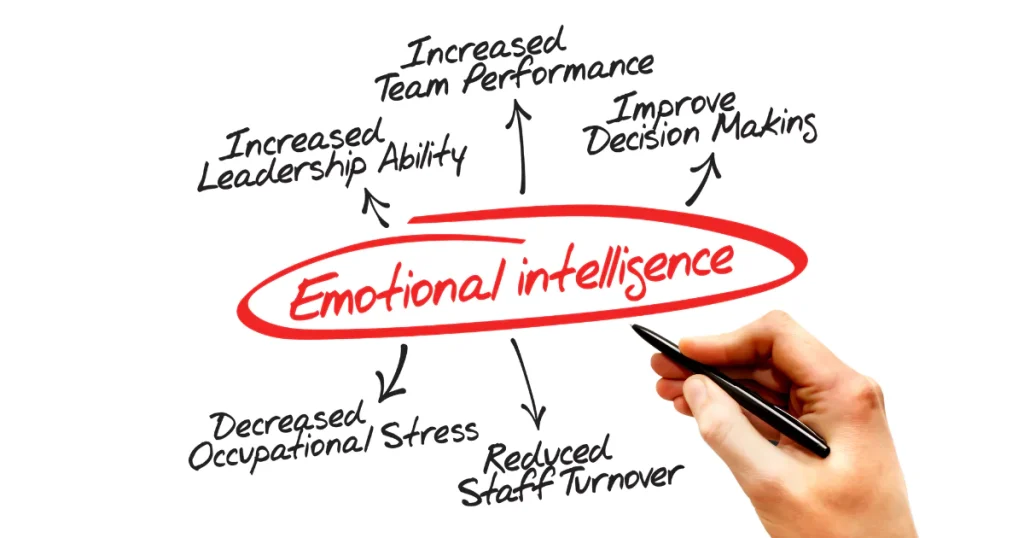
Ten Tough Networking Questions – and Ten Great Answers to Networking Them
Like emotional intelligence, networking EI must be honed diligently. Begin by noting your responses to social and work settings. Notice what causes stress, excitement, or discomfort.
Try to practice active listening in conversations that aren’t particularly high stakes. Just concentrate on the other person and what he has to say and not on what you want to say in return. This proficiency seamlessly maps to networking.
Approaches for Pre-Event Preparation
Prepare in the wings before networking events with intention and expectation management. If possible, research the speakers or attendees, so you can ask thoughtful questions or have something to say to break the ice.
Picture good interactions and warm up by making simple introductions that sound and feel good. This preparation allows for less anxiety and to show up more confidently.
Emotion Regulation Within Event
At events, you should check in with yourself periodically. Are you scared and exhausted, invigorated or somewhere in between? Take advantage of this new-found self-awareness to moderate yourself accordingly.
Take breaks when needed. Take a walk or seek out a quiet place to collect your thoughts. This self-soothing enables you to feel calm and balanced during the entire occasion.
Reflection and Learning After the Event
Each time after a networking event, think about what you did well and how you could do better. Which ones felt the most natural? What feelings did this inspire, and how did you process them?
You can’t help but become more and more refined and effective at networking your emotional intelligence, which will be useful at your next round of events.
Assessing the Influence of Emotional Intelligence on Your Network
Monitor the health of your professional relationships, not just the number. It’s a strong network if you know people in your network will respond to your outreach, send opportunities your way or respond to the content you put out professionally.
Pay attention if your networking is resulting in quality connections or just more small talk. Strategic connecting is about building and maintaining goodwill over time.
Tool Box of Emotional Intelligence for Networking
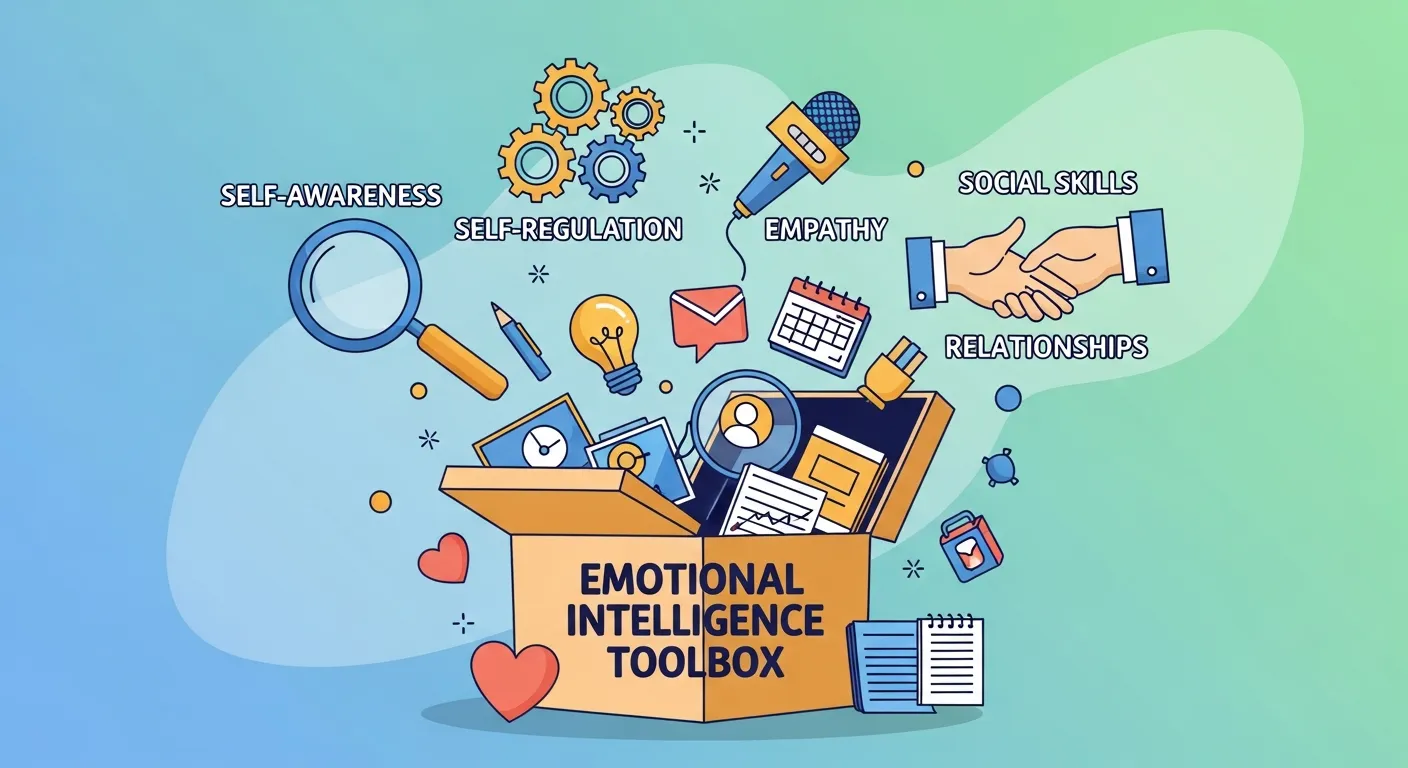
Emotional intelligence makes networking more about relationships and less about numbers. As you concentrate the most on getting to know yourself and others, genuine connections will come naturally, not forcefully.
Begin putting these into practice the next time you’re networking. Listen to the emotional undercurrents in the conversation. Observe what methods and how they impact the quality of your engagements.
The time and effort you invest in cultivating “emotional intelligence networking” will pay off for years to come. Powerful professional relationships are fountains of opportunity, support and collaboration, and their benefits range from the initial meeting you have with them.
Keep in mind that emotional intelligence is something that evolves over time. So every network opportunity you will have is a place where you can hone these skills, specifically with how you can go ahead and reach out to people in a real way, so that they know they can trust and believe in what you have to say.
Conclusion
Networking with emotional intelligence transforms how you connect professionally. It’s not the number of contacts that matters but the depth of the relationships you build. By mastering self-awareness, self-regulation, social awareness, and relationship management, you can form connections that lead to career growth, collaborations, and lasting business success. Emotional intelligence is a skill that improves with practice, so every networking opportunity is a chance to refine your abilities and strengthen your professional network.
FAQs – Networking with Emotional Intelligence
1. What is emotional intelligence in networking?
Emotional intelligence (EI) in networking refers to your ability to recognize, understand, and manage your own emotions while perceiving and responding to the emotions of others. It helps you navigate social interactions with awareness, empathy, and tact, allowing you to build authentic professional relationships rather than just collecting contacts. EI ensures your networking is meaningful and strategically effective.
2. Why is emotional intelligence important for networking?
Networking isn’t only about exchanging business cards—it’s about forming connections that matter. EI allows you to understand social dynamics, adapt to different personalities, manage difficult situations gracefully, and turn interactions into lasting professional relationships. People with strong EI are remembered positively, trusted, and approached for collaboration more often.
3. How can I improve my self-awareness at networking events?
Self-awareness is key to recognizing how you come across. Pay attention to your body language, tone of voice, and emotional reactions during conversations. After events, reflect on what went well and where you could improve. Identifying patterns in your behavior helps you adjust and approach future interactions more confidently and effectively.
4. What is self-regulation in networking?
Self-regulation is the ability to control impulses, manage stress, and respond thoughtfully rather than react emotionally. During networking events, this means staying composed if a conversation becomes awkward, not forcing connections, and maintaining professionalism even when faced with rejection or challenging personalities.
5. How do I read social cues effectively?
Reading social cues involves observing body language, eye contact, gestures, tone of voice, and energy levels. Notice when someone leans in, smiles, or engages actively versus when they seem distracted or distant. Adapting your approach based on these signals shows empathy and respect, improving the quality of your interactions.
6. How can I build genuine relationships, not just contacts?
Focus on meaningful engagement by actively listening, asking thoughtful questions, offering value, and showing genuine interest in the other person’s goals and challenges. Consistently following up, sharing helpful resources, and remembering personal details strengthens the bond beyond a single meeting.
7. What role does vulnerability play in networking?
Vulnerability fosters trust. Sharing professional challenges, lessons learned, or growth experiences humanizes you, making you relatable. When you open up appropriately, others are more likely to share in return, creating deeper, authentic connections that go beyond surface-level networking.
8. How can I overcome networking anxiety?
Networking anxiety is common, especially for introverts or those new to an industry. Manage it by setting realistic goals—e.g., aim for three meaningful conversations rather than talking to everyone. Prepare icebreakers or questions in advance, practice active listening, and take short breaks when overwhelmed. Mindful breathing or positive self-talk can also reduce stress during events.
9. How should I follow up after networking events?
Follow-up is critical. Reference something specific from your conversation to show you were listening. Send timely, personalized messages that express genuine interest in staying connected or collaborating. Consistent, thoughtful follow-up reinforces relationships and ensures you remain memorable.
10. What is the impact of EI on long-term professional relationships?
EI strengthens trust, improves conflict resolution, and encourages reciprocity. By consistently understanding and responding to others’ needs, you build relationships that endure over time. These connections often lead to referrals, mentorships, collaborations, and professional growth opportunities.
11. Can introverts benefit from networking with EI?
Absolutely. EI allows introverts to network strategically by focusing on quality over quantity. By leveraging active listening, empathy, and thoughtful follow-ups, introverts can form meaningful relationships without feeling overwhelmed by large crowds or high-pressure environments.
12. How can I continue improving my networking EI skills?
EI is developed over time through practice and reflection. Continuously evaluate your networking experiences, seek feedback from peers or mentors, practice active listening, observe social dynamics, and participate in training or workshops on communication and emotional intelligence. Gradually, your ability to navigate networking situations with confidence and authenticity will improve.


